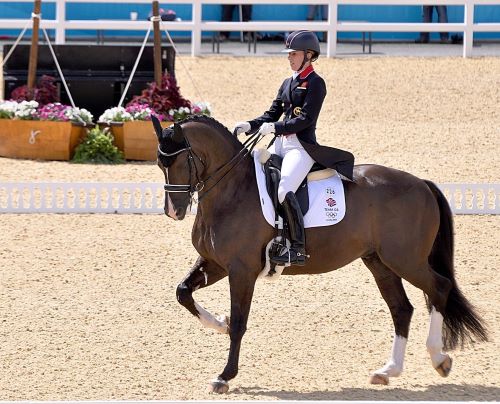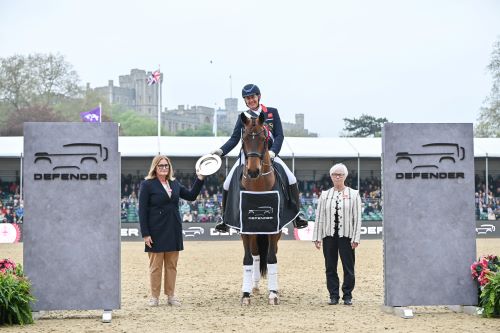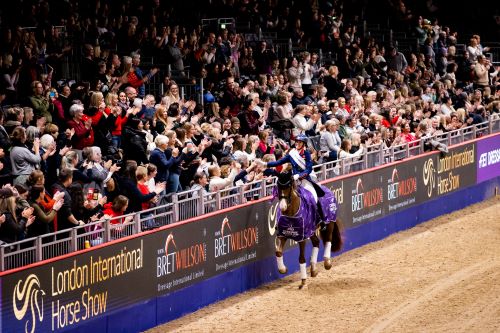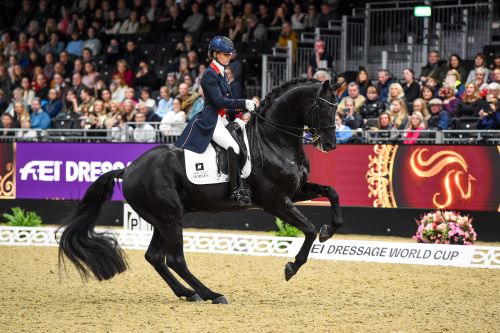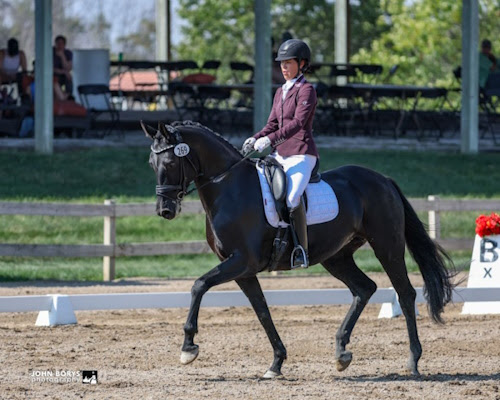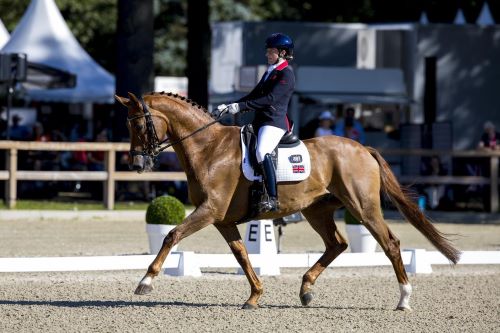Emile Faurie (GBR) and Bellevue @RoyalWindsorHorseShow/Peter Nixon
Dressage once again was at the forefront of the action on day two of Royal Windsor Horse Show. Competitors pulled out all the stops with high-energy performances accompanied by complex musical productions in The Defender CSI4* FEI Dressage Freestyle in the Castle Arena.
Elsewhere across the private grounds of Windsor Castle, Showing got underway with Championships taking place for the Working Hunter sponsored by Irish Horse Board, the Coloured divisions sponsored by the Leeman Family, and the RoR Tattersalls Thoroughbred Ridden Show Horse supported by Royal Windsor Racecourse.
National Showjumping saw some of the country’s best up-and-coming horses take centre stage in The Walwyn Novice Jumping Championship, sponsored by Martin Collins Enterprises, with The LeMieux National 1.40m Open Jumping Competition providing a thrilling competition for spectators.
BELLE(VUE) OF THE BALL
The pinnacle class of the day, The Defender CSI4* FEI Dressage Freestyle, took place with 10 combinations competing for the highly sought-after prize. Ever-popular, the Freestyle sees horses and riders competing to their own specifically chosen music track and floorplan, matched to a set number of the complex moves required at this level of Dressage. Unlike in the Grand Prix, judges provide two sets of marks, one for the technical execution and the other for artistic impression.
First into the Castle Arena was Britain’s Lisa Marriott, who was making her debut at the Show. Set to the iconic soundtrack from ‘The Holiday’, Marriott impressed judges to set the standard with a total score of 67.160%. Compatriot Nicholas Kröncke and Flanell – competing in only their second Freestyle test together – then took the lead with 71.100%. The German-born rider, who took a 17-year hiatus from top level sport and returned in 2021, changed nationalities at the beginning of this year to compete for Great Britain, having previously ridden successfully as part of the German Youth teams.
Australia’s Championship combination of Jayden Brown and Willingapark Quincy B could not quite match the personal best of 75.485% they set at CDI3* Hartpury last summer. However, their score of 74.415% was enough to put them into the top spot at this stage of the competition. Two further riders took to the iconic arena prior to the midway break – China’s Sarah Rao and Italy’s Nathalie Wahlund – however, neither could reach the score set by Brown.
After an interval, it was the second placed combination’s turn to canter down the centre line. Emile Faurie once again proved why he has represented Britain at Championship level so many times as he – much to the delight of the crowd – set the new standard of 76.280% with Bellevue. None of the remaining combinations, which included Gareth Hughes and Classic Goldstrike, could produce a test which matched the harmony and precision set by Faurie. Faurie’s victory in The Defender CDI4* FEI Dressage Freestyle capped a fabulous competition at Windsor, with Britain’s Lewis Carrier taking second and Singapore’s Caroline Chew completing the top three.
Following his win, Emile Faurie said: “It’s been a weird build-up to the Show because she [Bellevue] threw a splint six weeks ago, but she’s such an incredible, honest mare and she came and did her thing. Unfortunately, at the beginning of last year, I was diagnosed with cancer, so that led to significant time off and some serious operations, but I luckily had my great team and my rider Tom behind me to be able to get back on and go on to win today.”
Faurie went on to say: “I kept the programme quite simple as this was only Bellevue’s third ever Freestyle, but the music was composed by Tom Hunt especially; it’s an original score for us as a pairing.”
The victor closed with: “It’s always special to be here at Royal Windsor; it has that little extra magic – you don’t find that backdrop of the Castle anywhere else in the world. The English are such a ‘horse nation’ so the atmosphere from the crowd is amazing; you can feel their energy, and even when they’re silent you can hear them willing every rider on.”
HERE COME THE GIRLS
National Show Jumping got under way with the Redpost Equestrian Senior Foxhunter – First Round, sponsored by Martin Collins Enterprises. Of the 98 starters, it was Sally Goding with the seven-year-old mare Red Head who triumphed with a double clear in a time of 31.81, almost a second faster than Natasha Hewitt in second. Goding is a previous winner at Royal Windsor Horse Show, having also won The LeMieux 1.40m Open Jumping Competition in both 2022 and 2023. The 12 highest placed six-year-olds from this class qualified for The Walwyn Novice Jumping Championship, sponsored by Martin Collins Enterprises. Of these, five combinations made it through to the jump-off against the clock, with the Billy Stud’s Billy At Last coming out on top under Lucy Townley, and Nicole Lockhead Anderson coming in second by just a third of a second.
It was a successful day for Lockhead Anderson, who went one better in the next class to claim The LeMieux National 1.40m Open Jumping Competition with the eight-year-old gelding Mecoblue PS, by Messenger. The ‘Single Phase’ competition is always hotly contested, and this year included notable entries from World No. 2 Ben Maher and Royal Windsor Horse Show Ambassador Joseph Stockdale, who placed seventh and eighth, respectively.
Lockhead Anderson stated: “It’s great to be here riding in the beautiful Castle Arena in the LeMieux National 1.40m Open Jumping Competition at Royal Windsor Horse Show, we’re very lucky in Britain to have a show like it, and winning makes it even more special!”
Talking about her horse, Lockhead Anderson said: “Mecoblue PS is fantastic; he just gets better and better.” She went on to say: “He is very green but finds jumping the big jumps easy – he’s definitely one for the future – he gives you the feeling he could be here in the 5* next year.”
The British rider closed by saying: “We ended up flying to the last fence; he has a huge stride and luckily he trusted me to go for it; it paid off because we only just beat Ronnie Jones by a second.”
HM THE KING TAKES THE CROWN
HM The King struck gold twice in the Showing at Royal Windsor Horse Show, courtesy of First Receiver.
His Majesty’s ex-racehorse First Receiver first strode to victory in the hugely popular RoR (Retraining of Racehorses) Tattersalls Thoroughbred In-Hand Show Series Qualifier (Flat) supported by Royal Windsor Racecourse for the second year running, and then captured the overall Championship, exhibited by Chris Hunnable. Not long afterwards, First Receiver changed modes to win the RoR Tattersalls Ridden Show Series Qualifier (Flat) supported by Royal Windsor Racecourse with Katie Jerram-Hunnable in the saddle. To Jerram-Hunnable’s amazement and delight, they went on to land that Championship too.
Essex-based Jerram-Hunnable has shown horses for the Royal Family for many years, and one of her major success stories came with Her Late Majesty The Queen’s ex-racehorse Barbers Shop, who took every title on the show circuit in his second career and even stood overall Supreme of Show here at Royal Windsor.
First Receiver, a seven-year-old bay gelding, joined Jerram-Hunnable three years ago, after Her Late Majesty The Queen was considering a replacement for Barbers Shop.
“Her Majesty asked me to go to Sandringham and give her an opinion on this one,” said Katie. “He was still entire then, but I thought he had enormous potential as a future riding horse — three weeks later he came to my yard and he hasn’t left since!”
Jerram-Hunnable said: “It’s always very special to win at Windsor, but to do so with a horse belonging to the reigning monarch is a moment to treasure and I was amazed to take the Ridden Championship against some very strong competition.”
As a five-year-old, First Receiver won the Novice RoR title at the Royal International Horse Show, and the SEIB Racehorse to Riding Horse Final at Horse of the Year Show.
“We put him away after Windsor last year, as we felt he would benefit from some time out,” added Jerram-Hunnable, who intends to show him in Novice Riding Horse ranks.
Courses for the popular Working Hunter classes proved as testing as ever, and after two absorbing competitions, the overall Working Hunter Championship sponsored by Irish Horse Board title in the Castle Arena went to first-time Royal Windsor winner, Lancashire-based Adele Hanson with her upstanding Heavyweight victor, 12-year-old Irish-bred The Top Drawer.
To find out more about Royal Windsor Horse Show, visit www.rwhs.co.uk.
For more information, please contact:
Niki McEwen / rEvolution / nmcewen@revolutionworld.com
